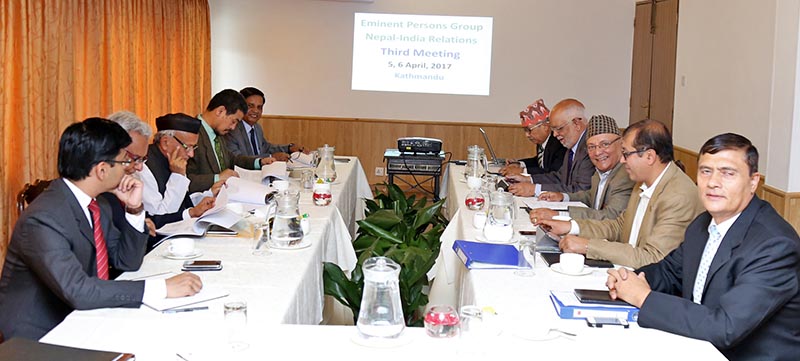EPG discusses replacing 1950 treaty
KATHMANDU: The Eminent Persons Group on Nepal-India Relations is mulling over enacting a new charter to replace the Nepal-India Peace and Friendship Treaty of 1950.
The third EPG meeting — that concluded in Kathmandu today— agreed in principle to enact a new charter in place of the 67-year-old Peace and Friendship Treaty, an EPG member from the Nepali side told THT.
“Whatever we name it, we shall recommend a new charter in place of the 1950 treaty,” said an EPG member seeking anonymity. The member, however, made it clear that the Nepali and Indian sides were yet to discuss and agree upon the content of the new charter.
The EPG is a joint mechanism of Nepal and India formed to make necessary recommendations on reviewing, revising or updating all existing bilateral treaties and agreements. The body has four members each from Nepal and India.
In a press briefing following the two-day meet, EPG coordinator from the Nepali side Bhekh Bahadur Thapa said the ‘centrepiece’ of the meeting was the 1950 treaty as many of its provisions had become irrelevant or redundant with the passage of time.
He, however, claimed that the two sides were yet to decide whether to ‘revise, rewrite or replace’ the treaty. “We have time to decide on it,” he added.
Thapa said the issue of the treaty would be further discussed during the next EPG meeting, which is scheduled to be held in Dehradun of India from May 29 to 31.
Nepal had not become a member of the United Nations when the charter was signed between the last Rana prime minister of Nepal Mohan Shumsher Jung Bahadur Rana and the then Indian Ambassador to Nepal Chandreshwar Narain Singh, in Kathmandu, on 31 July 1950.
The document has remained contentious for decades as some of its provisions — including Article (5) and Article (7) — were construed in Nepal as being against the principle of sovereign equality between the two nations. The issue of protocol of its signatories has also remained controversial.
Article (5) of the charter reads: “The Government of Nepal shall be free to import, from or through the territory of India, arms, ammunition or war-like material and equipment necessary for the security of Nepal. The procedure for giving effect to this arrangement shall be worked out by the two governments acting in consultation.”
Likewise, Article (7) of the treaty grants each-others’ citizens “the same privileges in the matter of residence, ownership of property, participation in trade and commerce, movement and other privileges of a similar nature.”
Meanwhile, the EPG meeting also discussed issues of bilateral trade and cooperation in Nepal’s water resources front, according to Thapa.
The Nepali side put forth issues concerning early execution of all pending joint-venture hydro electricity projects in Nepal and reiterated the need to resolve inundation and embankment problems, according to an official.
On the trade-related front, both sides discussed how to address the issues of trade imbalance and trade facilitation.
READ ALSO






